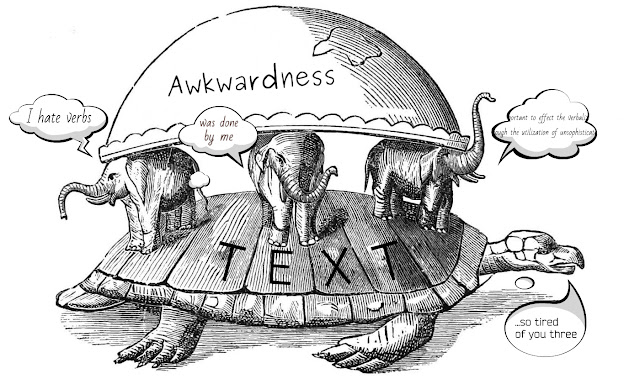Well. That was awkward.
The three elephants awkward writing rests on are nominalization, passive voice, and wordiness. All three are connected and often come together for a monthly Feast of Awkwardness. While these elephants keep merrily holding each other’s trunks in the text you edit, it just feels awkward to you.

Some are harder to spot and revise than others, especially if English is not your first language. So we’ll start with the biggest yet most elusive elephant: nominalization.
What is nominalization? Nominalization is, well, a nominalization. That is, the word itself exemplifies the concept perfectly. Basically, it is a combination of the verb “nominalize” and a noun-forming suffix, from which we may conclude that a nominalization is a verb used as a noun. You know, instead of performing its natural function. Which is being a verb.
Verbs describe actions or states, and no other part of speech does that job better. Still, some ESL writers, especially those whose first language is synthetic (Slavic languages are common offenders), cram nominalizations into every other sentence. Somehow, people think it makes them sound smart.
It doesn’t. Sorry.
Indeed, the trend to nominalize stuff comes from scientific writing (see? smart!), where what happens is often more important than who does it. The names of researchers are usually on the title page anyway, so who cares about them when you’re in the middle of a fascinating description of what they actually did there.
Good use of nominalization and passive voice is actually required in Master’s level papers and other solid research (see what I did there?), but unless you’re working on something that sophisticated, nominalizations actually make your writing weaker. Nouns are not as vivid as action verbs, and you usually have to add linking verbs (forms of “to be” and “there is/are” structures), not to mention other action verbs – you can’t have a sentence without a proper verb, after all. Well, you can, but that’s not what we’re talking about here. In the end, your neat, concise sentence swells up from five words to twelve, yet it does not become any more informative, detailed, or powerful. Writers may do that to inflate the word count (in a very, very stilted and artificial way), but we editors gotta do better than that.
The point is, you have to keep it to a minimum.
Sometimes you may feel that it is hard to express your idea without resorting to nominalizations. Here’s a few tips that may help you see another way:
1. Find verbs turned into nouns and turn them back into verbs: conduct an analysis of the data → analyze the data; give a statement → state/say; make a suggestion → suggest.
2. Replace various forms of “to be” with action verbs (pay special attention to “there is/are” structures): the aim of the researcher was to verify the hypothesis → the researcher aimed to verify the hypothesis; there is a need for clarification of the new curriculum → the school administration should clarify the new curriculum; there was a suggestion that... → the manager suggested that…
3. See if you can replace Passive voice structures with Active ones: the decision to postpone the launch of the new product was made by the company → the company decided to launch the new product later.
Some of these have double nominalizations. Yes, they do come in pairs often, and it’s our job to shoo them out and make way for these concise action-verb beauties.
Here’s some more examples:
"Consideration of career prospects is another important factor…" → The student should consider his or her career prospects…
"The beginning of the conflict is the first act." → The conflict begins in the first act.
"The opportunity of expression of opinions is another merit of online learning." → Online learning allows students to express their opinions freely.
"For success and proper recognition in the game, observation of other players is essential…" → To succeed and be recognized in the game, the player should observe others first.
"Armed with the intention to facilitate the entry of contemporary artists…" → To help contemporary artists enter…
"…whether consideration of their familiarity with art would be necessary." → …whether they need to be familiar with art.
Now, how would you revise these two sentences?
"The drop in the cost of technology allows drone accessibility."
"There are fears that the adoption of the legislation can be an inhibitor to the growth of the young industry."
This one is, perhaps, my favorite: "The [Japanese] provocation acted as a motivation for the subsequent American participation [in WWII]…"
Comments? Questions? Hate the elephant metaphor? Share your thoughts under this post!
Coming soon: “Awkwardness, Pt. 2: Passive Voice.”

No comments:
Post a Comment